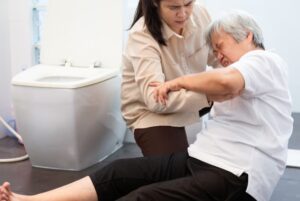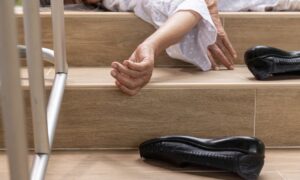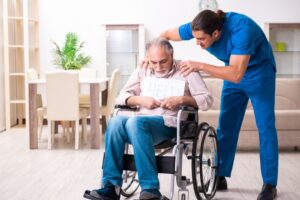Is a Nursing Home Liable for Falls?
Nursing Home AbuseIn many cases, nursing homes are liable for falls residents suffer due to the negligence of the facility and its caregivers. Nursing homes, long-term care facilities, and skilled nursing homes have a legal duty to create a safe place that minimizes the risk of falls. If they violate that duty, they may be accountable for the losses their residents suffer.
Proving this can be challenging. If you believe you have a claim, always consult a nursing home injury attorney.
The Consequences of Nursing Home Falls
A resident who falls in a nursing home is more likely to suffer ongoing health complications from the resulting injuries, especially if they already have some mobility issues. Falls are common and can be life-threatening.
The Agency for Healthcare Research and Quality states that there are 1.6 million people in the US living within nursing facilities of some type. Of them, about half will fall at some point each year. About 1 in 3 people fall two or more times each year.
When falls happen, they often have serious consequences, including:
- Serious injuries, including broken or fractured bones
- Decreased ability to function and remain mobile
- Increased fear of falling
- Ongoing restrictions (including those that are self-imposed) on activities
- Higher requirements for ongoing support
- Reduced quality of life
- Increased risk of death
Nursing home falls have a direct impact on the way a person views their safety. One fall means restrictions on quality of life to prevent additional falls.
The U.S. Centers for Disease Control and Prevention (CDC) notes that because of their frail nature, nursing home falls are some of the most serious injuries for residents to have. In some cases, they can lead to a drop in health and wellness that leads to early death.
When Is a Nursing Home Liable for Falls?
Nursing homes must put in place methods to reduce the risk of a person falling. It is a part of their legal duty to provide a safe home for residents. In situations where the nursing home fails to do this, and a patient falls and suffers injury, that can indicate negligence.
Falling is not an expected part of getting older. Family members should not assume that their loved one falling was just because of “old age” – nursing homes are responsible for minimizing that risk substantially. If the nursing home can prevent a fall, they should. Ultimately, it comes down to proving negligence in the situation. This means a nursing home should:
- Anticipate the needs of a resident
- Assess the resident’s risk for falling in various situations and environments
- Provide a safe place without fall risks
- Provide supervision if there is a high risk of a fall
- Maintain environments to minimize fall risks over time
Determining negligence requires careful consideration of the person’s reason for falling. By gathering evidence, nursing home abuse attorneys can uncover what happened that allowed a person to fall.
Common Causes of Nursing Home Falls
 Anyone can fall at any time, but the focus here is on taking steps to minimize preventable falls. It is the responsibility of the nursing home staff, then, to monitor, identify, and address, including intervene, when there is a risk.
Anyone can fall at any time, but the focus here is on taking steps to minimize preventable falls. It is the responsibility of the nursing home staff, then, to monitor, identify, and address, including intervene, when there is a risk.
Some of the most common reasons nursing home falls occur include the following:
- Poor lighting
- Environmental hazards, including loose carpeting, slippery floors, or something on the floor
- Lack of safety railings in the bathroom or on a bed
- Lack of staffing or supervision
- Medication errors that cause side effects and increase the risk of falls
- Mobility issues, including balance instability, that go unnoticed
- Staff misuse of gait belts
In most of these situations, nursing home staff are responsible for the injuries that occur. Poor lighting is an avoidable risk factor; ensure proper lighting throughout the location. Ensuring proper maintenance and care of the nursing facility helps minimize the risk of carpeting-related falls.
Can a nurse shortage be an excuse for a nursing home fall?
No, a lack of enough supervision and nursing staff to ensure that a person has proper protection is not an excuse for a location not providing proper care. Many residents require two people to help them move, especially from bed into a wheelchair. If this does not happen for any reason, the facility may be responsible for the losses.
The same applies to a lack of supervision. Even if a person gets up independently and falls, it can be negligence. If the location fails to provide enough supervision to ensure a resident gets the care they need, and the person falls, that can be negligence. This includes situations where a person wanders away or gets up even when told not to do so.
Fall Prevention Planning
Most nursing homes put in place a fall prevention plan, a step-by-step guide to the requirements nursing staff must adhere to to minimize the risk of falls. There are various methods of preventing falls, including falls from beds, wheelchairs, or while walking. Even in unstable patients, the proper equipment and support can minimize the risk of a person falling.
Some of the following methods may serve as a type of prevention measure for those at risk of falling out of bed:
- Bed rails: In some situations, nursing homes will incorporate bed rails to prevent residents from getting out of bed or rolling out of bed accidentally. They must be installed properly, used appropriately, maintained, and paired with the right type of mattress.
- Floor pads: In some situations, the placement of floor pads on the side of a bed may be beneficial. This can help to absorb the force from a fall, reducing the risk of injury.
- Bed alarms: These alarms send the nursing staff an audible or silent signal that a person got out of bed. Some of the following methods may serve as a prevention measure for those at risk of falling out of bed. It senses a person’s weight change, indicating a person stood up.
- Toileting schedules: Many residents fall when getting out of bed to use the restroom. With toileting schedules that ensure routine visits to the bathroom, the risk of a sudden need is lower.
- Low beds: Reducing the height of a bed also helps to make standing easier. It creates a lower fall height, too. Both of these factors can help to reduce the risk of serious complications from falls.
- Frequent supervision: There is no doubt that a nursing home resident needs to have proper supervision to minimize the risk of falls. A lack of scheduled, routine, and frequent checks can put a person at risk.
- Cameras: In some situations, family members may wish to install cameras that can monitor a person in a nursing home from a distance. This is often the best option when there are additional risks, such as a threat of abuse or a person who tends to wander or self-harm.
Laws ultimately determine when nursing homes can use these measures. In some situations, it is not allowable to restrain a person to a bed even if they are a safety risk. Viewing this as a form of abuse is warranted.
How to Know Your Family Member Is a Victim of Nursing Home Abuse
 Most state laws require that the nursing home staff contact the point of contact in a situation where a resident falls. This is an unsafe situation, even if the patient feels okay afterward. Someone should specifically inform you about this occurrence.
Most state laws require that the nursing home staff contact the point of contact in a situation where a resident falls. This is an unsafe situation, even if the patient feels okay afterward. Someone should specifically inform you about this occurrence.
How can you be aware of its occurrence if no one informed you? There are some signs to consider that may indicate a person fell:
- Hesitation to get up or walk. If a person suddenly is no longer willing to get up and move around, this often is a signal of a fear of falling. Situations where a person fell previously often bring it on.
- Bruises, gashes, or other injuries. These often occur in a fall because many nursing home patients are frail. Injuries are more likely, and that means bruises or cuts can be more substantial. The nursing staff must explain all injuries or changes in a person’s well-being.
- Communication with the resident. Your family member may make statements that indicate they feel indirectly or directly. “I do not want to fall again.” Or they may say, “It happened when I tripped.” Some people may not be willing or may be embarrassed to admit that they fell.
- Weakness in lower extremities. In some situations, a person may wince in pain but not have any visible signs of injury on their skin. This can be due to a broken bone or a muscle-related injury from falling.
- Other people witness it. If your family member is in the same room as others, that other person may be more willing to provide information to you than you think. They may be more aware of what occurred than a resident who may not be mentally capable of communicating it.
Try not to rely on a family member to communicate that they fell, how, or why it occurred. They cannot tell you. They may not remember if medications were the cause. Other times, strokes and dementia may get in the way of their ability to communicate what occurred. Being vigilant is the only thing you can do to minimize this lack of communication.
How a Nursing Home Abuse Attorney Can Help You Prove Negligence
In a situation like this, a nursing home abuse attorney is an ideal professional to turn to for one-on-one help. They will provide the hands-on support needed to navigate the situation. This includes getting the necessary evidence to prove what occurred. Some of the ways your attorney will do this include the following:
- Speaking to witnesses. Information from other residents, nurses, staff, and others present during the incident may provide helpful insight.
- Nursing logs. This can provide insight into when a family member received care, who provided it, and what care they received.
- Professionals. By getting medical professionals’ opinions, it may be possible to better formulate an understanding of what occurred. This information may help your attorney to piece together what occurred.
A compassionate attorney will speak to your family member in a polite and friendly manner. These are delicate situations. Getting to the bottom of it is always the goal.
Signs You Should Seek Legal Support for Nursing Home Abuse
If you notice any of the following, it may be necessary to seek additional support by contacting a nursing home abuse attorney.
- Signs of injury that the nursing staff does not explain or explain well
- Cluttered resident rooms or halls indicate a lack of care
- Long wait times between requesting care and receiving it
- A lack of enough staff to provide ongoing support and needs to the resident
- Staff that seems unwilling to help or complains about providing care
- Changes in the mental health or cognition of a family member
- Excessive or improper medication use that can alter a person’s stability
- Statements from family members or others witnessing injury, aggressive behavior, lack of supervision, or falls directly
The sooner you act in these situations, the better. As noted by the CDC, falls cause 800,000 people to experience injuries, often involving a head injury or hip fracture. It is also the most common cause of traumatic brain injuries, especially in those who are older.
If a nursing home fails to provide a safe place for your family member, they can be held responsible for any losses incurred. This may encompass medical bills related to the fall, loss of quality of life, and pain and suffering. Many of the injuries that result from falls are preventable with proper fall risk management, and holding the nursing home accountable is crucial for ensuring the well-being of residents.
If this is not happening in your family member’s nursing home, seek legal help. Turn to an experienced personal injury attorney for one-on-one guidance throughout this sometimes challenging legal matter. Your attorney can guide you to get the legal representation you need, assess the viability of your case, and take the necessary steps to hold the nursing home accountable for any negligence or abuse. With their experience, you can confidently navigate the legal process and work towards securing justice and proper care for your loved one.
Nathan Hughey, an attorney and fourth-generation South Carolinian, founded Hughey Law Firm in 2007. Before that, he spent five years defending nursing homes and insurance companies. Leveraging his experience, he now advocates for those injured or wronged by such entities, securing over $290 million in verdicts and settlements.
